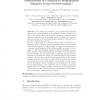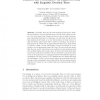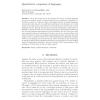1842 search results - page 5 / 369 » Measurement theory in linguistics |
NLE
2010
13 years 6 months ago
2010
In this article, we present a comprehensive study aimed at computing semantic relatedness of word pairs. We analyze the performance of a large number of semantic relatedness measu...
MDAI
2004
Springer
14 years 29 days ago
2004
Springer
ESSLLI
1999
Springer
13 years 12 months ago
1999
Springer
We recall the concept of a linguistic variable and the representation of its values (i.e. linguistic terms) by means of fuzzy sets. In this framework adverbs are represented by fuz...
IFSA
2007
Springer
14 years 1 months ago
2007
Springer
Abstract. Generally, there are two main streams of theories for studying uncertainties. One is probability theory and the other is fuzzy set theory. One of the basic ideas of fuzzy...
GRAMMARS
1998
13 years 7 months ago
1998
From the perspective of the linguist, the theory of formal languages serves as an abstract model to address issues such as complexity, learnability, information content, etc. which...



